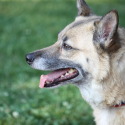A digestive disorder is a health issue reducing the digestion or absorption of food, or altering its passage through the digestive tract. Gastrointestinal (GI) disorders will cause pain and other problems impacting a dog’s or cat’s stomach and intestines. Efficient digestion is essential so your pet can build tissues, repair tissues and gain energy.
GI disorders may also lead to dehydration, malnutrition, and imbalances to acid-base and electrolytes. So it’s critical to recognize symptoms and consult with your veterinarian for recommendations on intestinal illness recovery.
Dogs
While some dogs can eat whatever they find—even if it’s not “food”—not every dog is so lucky. If your dog has intermittent loose stools, occasional vomiting or excessive flatulence, he may have a sensitive stomach.
The first step to recovery from a stomach or intestinal illness is to simplify your dog’s food consumption. Eliminate table scraps, limit snacks to just one type of highly digestible treat and make sure he doesn’t have access to the garbage, etc.
Also evaluate the quality of your pet’s food. Dog foods made from high quality ingredients tend to be much more digestible than those featuring lower quality ingredients. Since fat is more difficult to digest than proteins and carbohydrates, look for a dog food containing a moderate level of approximately 15 percent fat.
Foods with a source of both soluble and insoluble fiber, vitamins and minerals can also improve your dog’s digestive function.
Cats
With cats, the most common sign of a digestive disorder is diarrhea or a soft stool. Other symptoms include vomiting, flatulence, regurgitation and weakness.
For stomach illness recovery in cats, veterinarians also recommend a highly digestible cat food with high-soluble and insoluble fiber. Be sure to monitor your cat’s hydration during the recovery phase to help ensure it has adequate water in its system.
Modifying your dog’s or cat’s nutrition during a gastrointestinal illness may help him feel better.
Focus on feeding your pets lower calorie foods in small portions multiple times throughout the day. High calorie foods can actually contribute to digestive discomfort. Stick with canned foods, as they are more nutrient dense, more palatable and have a higher moisture content that help a vomiting pet stay hydrated.
For dogs, consider freezing small amounts of Evanger’s wet canned food into a Kong. This slows the consumption pace and helps limit digestive stress while still delivering nutrients.
If the stomach/intestinal illness requires medication, tasty canned food will also help hide the med taste. Again, feeding a variety of additive free foods containing moderate fat can improve your dog’s or your cat’s overall health.
If symptoms are severe or if switching to a highly digestible food fail to improve your pet’s stomach or intestinal disorder, talk to your veterinarian about what may be a more serious condition like a food allergy or inflammatory bowel disease.



